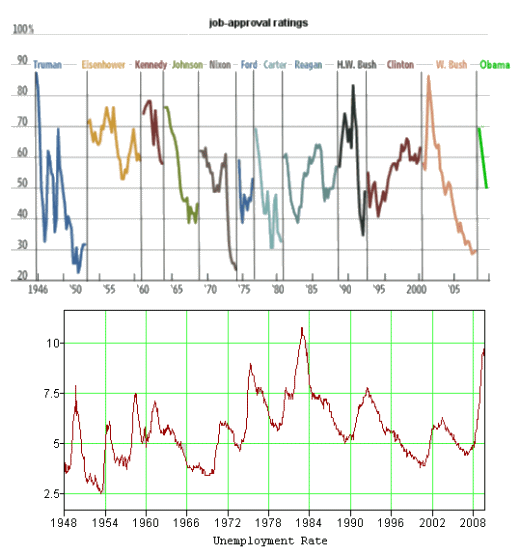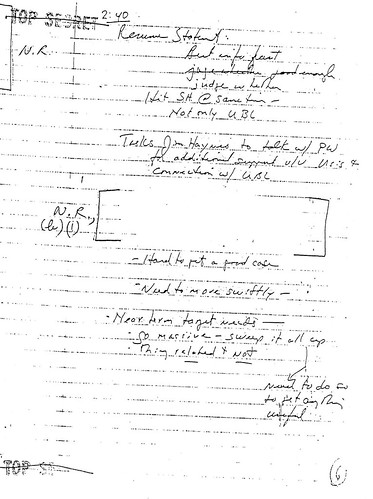Posted on Wednesday 2 December 2009
… a meeting Bush held on January 31, 2003 with Tony Blair and six of Bush and Blair’s top aides to discuss the Iraq issue. According to a memo summarizing the meeting that was written by David Manning [then Blair’s foreign policy adviser and later British ambassador to Washington], Bush actually indicated that he was willing to provoke a confrontation with Saddam… Among the ways Bush proposed to provoke a confrontation was to paint U2s to look like UN airplanes. The theory was that if Saddam tried to fire on them, it would justify military action… This Manning memo got limited play in the press – it was mentioned only in passing in an NYT front-page story in March 2006. However, even without the plans to use U2 aircraft disguised in UN colors, the memo is absolutely damning…
But behind closed doors, the president was certain that war was inevitable. During a private two-hour meeting in the Oval Office on Jan. 31, 2003, he made clear to Prime Minister Tony Blair of Britain that he was determined to invade Iraq without the second resolution, or even if international arms inspectors failed to find unconventional weapons, said a confidential memo about the meeting written by Mr. Blair’s top foreign policy adviser and reviewed by The New York Times."Our diplomatic strategy had to be arranged around the military planning," David Manning, Mr. Blair’s chief foreign policy adviser at the time, wrote in the memo that summarized the discussion between Mr. Bush, Mr. Blair and six of their top aides.
"The start date for the military campaign was now penciled in for 10 March," Mr. Manning wrote, paraphrasing the president. "This was when the bombing would begin."It’s one thing for a president to mislead his own people about a threat to the nation. But if Bugliosi and this NYT story are to be believed, then the invasion of Iraq is an American war of aggression, and all of the deaths of the American soldiers up to this point amount at the very least to second-degree murder…
Bush "made clear to Prime Minister Tony Blair of Britain that he was determined to invade Iraq without the second resolution, or even if international arms inspectors failed to find unconventional weapons." I suppose we knew [or suspected] that Bush was going to invade Iraq no matter what even back then. But having it written down on paper gives it a sharper edge. I don’t know if that Memo is in the public domain, though there are enough reports about it to be pretty clear about what happened at that meeting. It was the week before Powell was set to go to the U.N. and make an absolute fool of himself [and us], and only three days after Bush’s State of the Union message with the famous sixteen words: "The British Government has learned that Saddam Hussein recently sought significant quantities of uranium from Africa."
According to documents provided by former US Treasury Secretary Paul O’Neill, George W. Bush, ten days after taking office in January 2001, instructed his aides to look for a way to overthrow the Iraqi regime. A secret memo entitled "Plan for post-Saddam Iraq" was discussed in January and February 2001, and a Pentagon document dated March 5, 2001, and entitled "Foreign Suitors for Iraqi Oilfield contracts", included a map of potential areas for petroleum exploration.
Mercifully, we had a window rattling windstorm last night, waking to a cold, dark, non-electric house and were media-free until the afternoon. So I had no temptation to watch/read the aftermath of Obama’s plans in Afghanistan. What I thought about in the dark, lit by a fire crackling in the fireplace, was the road that lead to this absolutely impossible situation. More and more, I’m suspicious that all the things that seemed so stupid along the way were actually preconceived way-points on the path to Iraq – ignoring warnings of an impending al Qaeda attack, Cheney’s secret Energy Conference, letting bin Laden escape at Tora Bora, the C.I.A. "torture program." Each of these may well have been elements in crafting the fictional rationale for the invasion of Iraq.
And the Manning Memo documents Bush’s finally coming clean about his intent. There’s no "why" mentioned in that meeting with Blair that I can find in any of the reports by people who have read it up close. Why go ahead without the U.N.’s approval? Why proceed even if there were no Weapons of Mass Destruction found by the inspectors? We suspect it was for oil, from paranoia, for power ["superpower"], for dominion in the Middle East, for revenge, for all kinds of things the neoconservatives liked to think about.



 In his memoir, At the Center of the Storm, former CIA Director Tenet said it was evident from the start that aerial bombing would not be enough to get bin Laden at Tora Bora. Troops needed to be in the caves themselves, he wrote, but the Afghan militiamen were ‘‘distinctly reluctant’’ to put themselves in harm’s way and there were not enough Americans on the scene. He said that senior CIA officials lobbied hard for inserting U.S. troops. Henry Crumpton, the head of special operations for the CIA’s counterterrorism operation and chief of its Afghan strategy, made direct requests to Franks. Crumpton had told him that the back door to Pakistan was open and urged Franks to move more than 1,000 Marines who had set up a base near Kandahar to Tora Bora to block escape routes.
In his memoir, At the Center of the Storm, former CIA Director Tenet said it was evident from the start that aerial bombing would not be enough to get bin Laden at Tora Bora. Troops needed to be in the caves themselves, he wrote, but the Afghan militiamen were ‘‘distinctly reluctant’’ to put themselves in harm’s way and there were not enough Americans on the scene. He said that senior CIA officials lobbied hard for inserting U.S. troops. Henry Crumpton, the head of special operations for the CIA’s counterterrorism operation and chief of its Afghan strategy, made direct requests to Franks. Crumpton had told him that the back door to Pakistan was open and urged Franks to move more than 1,000 Marines who had set up a base near Kandahar to Tora Bora to block escape routes.![Dalton Fury [pseudonym] Dalton Fury [pseudonym]](http://freshfiction.com/images/authors/20233.jpeg) On December 14, the day bin Laden finished his will, Dalton Fury finally convinced Ali and his men to stay overnight in one of the canyons that they had captured during daylight. Over the next three days, the Afghan militia and their American advisers moved steadily through the canyons, calling in airstrikes and taking out lingering pockets of fighters. The resistance seemed to have vanished, prompting Ali to declare victory on December 17. Most of the Tora Bora complex was abandoned and many of the caves and tunnels were buried in debris. Only about 20 stragglers were taken prisoner. The consensus was that Al Qaeda fighters who had survived the fierce bombing had escaped into Pakistan or melted into the local population. Bin Laden was nowhere to be found. Two days later, Fury and his Delta Force colleagues left Tora Bora, hoping that someone would eventually find bin Laden buried in one of the caves.
On December 14, the day bin Laden finished his will, Dalton Fury finally convinced Ali and his men to stay overnight in one of the canyons that they had captured during daylight. Over the next three days, the Afghan militia and their American advisers moved steadily through the canyons, calling in airstrikes and taking out lingering pockets of fighters. The resistance seemed to have vanished, prompting Ali to declare victory on December 17. Most of the Tora Bora complex was abandoned and many of the caves and tunnels were buried in debris. Only about 20 stragglers were taken prisoner. The consensus was that Al Qaeda fighters who had survived the fierce bombing had escaped into Pakistan or melted into the local population. Bin Laden was nowhere to be found. Two days later, Fury and his Delta Force colleagues left Tora Bora, hoping that someone would eventually find bin Laden buried in one of the caves.  There was no body because bin Laden did not die at Tora Bora. Later U.S. intelligence reports and accounts by journalists and others said that he and a contingent of bodyguards departed Tora Bora on December 16. With help from Afghans and Pakistanis who had been paid in advance, the group made its way on foot and horseback across the mountain passes and into Pakistan without encountering any resistance. The Special Operations Command history noted that there were not enough U.S. troops to prevent the escape, acknowledging that the failure to capture or kill bin Laden made Tora Bora a controversial battle. But Franks argued that Tora was a success and he praised both the Afghan militias and the Pakistanis who were supposed to have protected the border. ‘‘I think it was a good operation,’’ he said in an interview for the PBS show Frontline on the first anniversary of the Afghan war. ‘‘Many people have said, ‘Well, gosh, you know bin Laden got away.’ I have yet to see anything that proves bin Laden or whomever was there. That’s not to say they weren’t, but I’ve not seen proof that they were there.’’
There was no body because bin Laden did not die at Tora Bora. Later U.S. intelligence reports and accounts by journalists and others said that he and a contingent of bodyguards departed Tora Bora on December 16. With help from Afghans and Pakistanis who had been paid in advance, the group made its way on foot and horseback across the mountain passes and into Pakistan without encountering any resistance. The Special Operations Command history noted that there were not enough U.S. troops to prevent the escape, acknowledging that the failure to capture or kill bin Laden made Tora Bora a controversial battle. But Franks argued that Tora was a success and he praised both the Afghan militias and the Pakistanis who were supposed to have protected the border. ‘‘I think it was a good operation,’’ he said in an interview for the PBS show Frontline on the first anniversary of the Afghan war. ‘‘Many people have said, ‘Well, gosh, you know bin Laden got away.’ I have yet to see anything that proves bin Laden or whomever was there. That’s not to say they weren’t, but I’ve not seen proof that they were there.’’ 
![[click to enlarge] [click to enlarge]](http://www.edwardjayepstein.com/2002image/netherpopup.gif)
 on earth, he and several hundred of his men, the largest concentration of Al Qaeda fighters of the war, endured relentless pounding by American aircraft, as many as 100 air strikes a day. One 15,000-pound bomb, so huge it had to be rolled out the back of a C-130 cargo plane, shook the mountains for miles. It seemed only a matter of time before U.S. troops and their Afghan allies overran the remnants of Al Qaeda hunkered down in the thin, cold air at 14,000 feet.
on earth, he and several hundred of his men, the largest concentration of Al Qaeda fighters of the war, endured relentless pounding by American aircraft, as many as 100 air strikes a day. One 15,000-pound bomb, so huge it had to be rolled out the back of a C-130 cargo plane, shook the mountains for miles. It seemed only a matter of time before U.S. troops and their Afghan allies overran the remnants of Al Qaeda hunkered down in the thin, cold air at 14,000 feet.![[click to enlarge] [click to enlarge]](http://www.csmonitor.com/2002/0128/csmimg/0128p10a.jpg)
 It’s certainly consistent with what we already know. Our leaders were tentative at the outset, not wanting to commit adequate troops to do the job. They approached this heavy task with a "light footprint." I find their stated logic for why unconvincing, just as unconvincing as trying to invade Iraq with a minimal force. While the folly of their decisions is obvious now, I think it was obvious then too.
It’s certainly consistent with what we already know. Our leaders were tentative at the outset, not wanting to commit adequate troops to do the job. They approached this heavy task with a "light footprint." I find their stated logic for why unconvincing, just as unconvincing as trying to invade Iraq with a minimal force. While the folly of their decisions is obvious now, I think it was obvious then too.
 So how does a Fox news article connect with an Iraq Humvee photo? Judith Miller is how. On our trip, we were in stores where racks of television sets were turned on, and I recognized a voice – and when I looked, there was Judith Miller on Fox News waxing eloquent. We all remember her as the New York Times writer who broke all the prewar stories about Iraq that turned out to have come from either Amhad Chalabi’s INC or Scooter Libby [and were all incorrect]. Then she was a recipient of one of the Anthrax letters. Then she was embedded in Iraq racing around looking for WMD’s [reporting a maybe find that turned out to be wrong]. Then she went to jail for a few months as a 1st Amendment Martyr in the CIA Leak Inquiry. Then she got fired from the NYT. Now Judith Miller is back, writing and paneling on Fox News.
So how does a Fox news article connect with an Iraq Humvee photo? Judith Miller is how. On our trip, we were in stores where racks of television sets were turned on, and I recognized a voice – and when I looked, there was Judith Miller on Fox News waxing eloquent. We all remember her as the New York Times writer who broke all the prewar stories about Iraq that turned out to have come from either Amhad Chalabi’s INC or Scooter Libby [and were all incorrect]. Then she was a recipient of one of the Anthrax letters. Then she was embedded in Iraq racing around looking for WMD’s [reporting a maybe find that turned out to be wrong]. Then she went to jail for a few months as a 1st Amendment Martyr in the CIA Leak Inquiry. Then she got fired from the NYT. Now Judith Miller is back, writing and paneling on Fox News. 
